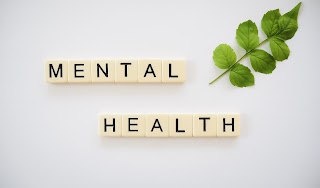Mental Health
Cognitive, behavioral, and emotional health are all included in mental health. It all comes down to how people act, feel, and think. We sometimes mean the absence of a mental condition when "mental health" is used.
What is Mental Health?
Mental health is a condition of well-being characterized by self-awareness. The ability to handle everyday challenges, the capacity for productive work, and the capacity to contribute to one's community.
The WHO emphasizes that having a healthy mental state involves "more than just being free of mental impairments or illnesses."
Peak mental health involves maintaining continual wellbeing and enjoyment. In addition to avoiding illnesses.
They also stress the importance of protecting and regaining mental health for each person and all communities and societies worldwide.
According to the National Alliance on Mental Illness, over 1 in 5 adults in the United States struggle with mental health issues on a yearly basis.
What is the Importance of Mental Health?
1. Mental Health has a Grave Impact on Physical
Our physical and mental health are interdependent. Stress and our immune systems can both be impacted by mental illness.
Also, our bodies' capacity to deal with diseases may be compromised as a result. Anxiety and melancholy brought on by a sick mind might make it challenging.
To move around and keep active. The mind-body connection is well documented, which is why it is so important to be mindful of mental health issues. Physical Health and Mental Health Interact:
Our physical and mental well-being are related to one another. Stress and our immune systems can both be impacted by mental illness.
Moreso, our bodies' capacity to deal with diseases may be compromised as a result.
Anxiety and melancholy brought on by a sick mind might make it challenging to move around and keep active.
The mind-body connection is well documented, which is why it is so important to be mindful of mental health issues.
2. Mental Health Influences Productivity and Financial Stability
The fact that mental increases your overall productivity and financial security. This is only one of the many reasons it's so important to take care of your mental health.
People with severe mental illnesses make 40% less money than people in good mental health, according to research in the American Journal of Psychiatry.
The World Health Organization estimates that depression alone accounts for about 200 million lost workdays annually.
It is well established that diminished productivity is due to poor mental health. Has an effect on financial stability.
To ensure excellent work performance and financial security. It is essential that we take the proper steps for mental wellness.
3. The Quality of Life is Impacted by Mental Health.
It is obvious from the discussion above why it is crucial to look after your mental health. We may become disinterested in the activities we once found enjoyable due to mental illness.
It can cause ups and downs and overwhelm us. To the point where we are unable to continue even with the simplest activities.
Emotions of hopelessness, sadness, unworthiness, guilt, anxiety, dread, and a sense of losing control frequently accompanied untreated mental illness.
Before it's too late, it's critical to notice these symptoms and get advice on maintaining mental health from a licensed expert.
4. Mental Health Influences Emotional Well-Being
Every day, your internal well-being is just as significant as your physical health. Advice on mental health explains how having a bad attitude can make you feel unhappy, annoyed, or disturbed.
Being emotionally healthy can increase our productivity and effectiveness at work and in our daily activities.
However, we can ask friends, family, and psychologists for mental health guidance to keep tabs on our emotional and general well-being.
5. Relationships are Crucially Impacted by Mental Health:
The relationship between mental health and relationships is one of the most compelling arguments for its significance.
Mental health plays a critical role in relationships. Interactions with friends and family may be impacted by mental illness.
Passive aggressiveness, antagonism, and a lack of social skills are frequently side effects of mental diseases.
Also, conflicts with our friends and family could emerge from this. Mental illness can drive us to unjustly overthrow our loved ones.
Self-care for our mental health, along with medication if necessary, can help us preserve both our relationships and our mental stability.
Frequently Asked Questions on Mental Health and its Importance
1. What Causes Poor Mental Health?
For instance, childhood abuse, trauma, or neglect.
may have the potential to cause a period of poor mental health.
either social exclusion or loneliness enduring racism and other forms of discrimination.
2. How Do You Know if you're Mentally Broken?
You feel depressive, ashamed, hopeless, or despairing emotions.
feeling powerless having the impression that one has irreversible injury.
loss of previous beliefs.
3. What Causes Mental Breakdowns?
The inability to handle extreme stress is ultimately.
What leads to a nervous breakdown. but each person experiences it differently.
Poor coping skills, mental illness, family obligations, and work-related stress.
Are all factors that might cause a nervous breakdown. and impair one's capacity to carry out daily activities.
The state of your mental health can have a significant effect on every aspect of your life. Don't be afraid to seek assistance from a qualified therapist.
If you're having trouble handling mental health issues on your own.
We hope this was a great read. Let us know your thoughts and suggestions in the comment. feel free to share with loved ones and active media accounts.









